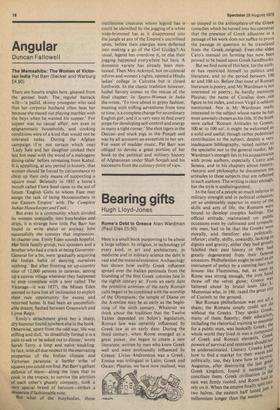Angular
Duncan Fallowell
The Memsahibs: The Women of Victorian India Pat Barr (Secker and Warburg £4.90) There are bizarre angles here, gleaned from the genteel bush. The regular barrack wife--'a pallid, skinny youngster who said that her corporal husband often beat her because she stayed out playing marbles with the boys when he wanted his supper.' For supper was no casual affair, not even in epigrammatic households, and cooking conditions were of a kind that would not be tolerated today. During the Afghan campaign (I'm not certain which one) 'Lady Sale and her daughter cooked their last hot meal with the wood of a mahogany dining-table' before retreating from Kabul. It is appalling, at any period in history, that women should be forced by circumstance to chop up their only means of supporting a square meal. Belatedly in 1892 a horse's mouth called Flora Steel came to the aid of future 'English Girls to whom Fate may assign the task of being Housemothers in our Eastern Empire' with The Complete Indian Housekeeper and Cook.
But even in a community which divided its women unequally into busybodies and drips, it is strange how little Pat Barr has found to write about or anyway how successfully she conveys that impression. In chapter one, Emily Eden sounds hopeful. Her little family group, two spinsters and a brother who had a crack at being GovernorGeneral for a bit, were 'gradually acquiring the Indian habit of denying ourselves nothing.' But after fronting an up-country tour of 12,000 persons in caravan, setting up a canvas village wherever they happened to stop (complete with a tent called The Vicarage-it was 1837), the Misses Eden seemed to have lost all inclination to exploit their rare opportunity for excess and returned home. It had been an uncomfortable dream, flashed between Greenwich and Lyme Regis.
Emily's detachment gives her a sharp, dry humour found nowhere else in the book. Otherwise, apart from the odd war, life was stifling and dull, 'so dreadfully formal it is a pain to ask or be asked out to dinner,' wrote Sarah Terry, a limp and naive weakling. In fact, with all due respect to the enervating properties of the Indian climate and Victorian paranoia, a feebler tribe of squaws you could not find. Pat Barr's gallant defence of them--along the lines that to cook in the tropics, to survive the attrition of each other's ghastly company, took a very special brand of heroism—strikes a desperate if fashionable note.
But what of the busybodies, those mettlesome creatures whom legend has it could be identified by the jogging of a white wide-brimmed hat as it disappeared into the jungle at any of the Empire's uncivilised spots, before their energies were deflected into making a go of the Girl Guides? As usual, legend has overdone it, or else their jogging happened everywhere but here. A domestic variety has already been mentioned. Then Mrs Ackroyd, hot on colonial reform and women's rights, opened a Hindu ladies' college in Calcutta but it closed forthwith. In the classic tradition however, Isobel Savory comes to the rescue of the final chapter. In Sports-Woman in India she wrote, 'To rove about in gypsy fashion, meeting with trifling adventures from time to time, is a complete change for an ordinary English girl; and it is very easy to find every scope for developing self-control and energy in many a tight corner.' She shot tigers in the Deccan and stuck pigs in the Punjab and was by all accounts an exception to her sex. For want of madder music, Pat Barr was obliged to devote a great portion of her book to the political and military history of Afghanistan under Shah Soojah and his successors from the culinary point of view.


























 Previous page
Previous page